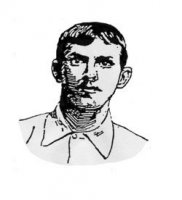William Bradshaw

5'8" 10st.10lb.
b. Padiham 3 April 1884
d. Blackburn 6 June 1955
Debut 12 September 1903 (19y 162d) Final Game 28 February 1920 (35y 331d)
First Goal 24 September 1904 Final Goal 6 December 1919
CAREER: Club Street School (Giles Street);Padiham Tradesmen ‘99Padiham ‘99;Accington Stanley '02; Blackburn Rovers May'03 (£110);Rochdale (p-m) Jul'20-Sep'20.
INTERNATIONALS England 4 apps
’10 v Wal,Ire.’12 v Ire.’13 v Wal.
FOOTBALL LEAGUE 5 apps ’05 v IL.’06 v IL.’10 v Sth L.’11 v Sth L,SL.
FL 386 apps 36 gls 1 og
FAC 39 apps 3 gls
CS 1 app
Total 426 apps 39 gls et 90m 1 og
Penalty record T 28 Sc 22 Sv 4 M 2
Emergency goalkeeper 8 g 305 m 9 gls
LC 30 apps 5 gls et 60m
War time
L 31 apps 11 gls
Pens T 11 Sc 7 Sv 3 M 1
Goalkeeper 1 app (inc in above)
Pens F 1 M 1
Minutes per goal 45
A fixture for more than a dozen seasons, despite losing much of his career to the Great War, Bradshaw was a manager's dream, hard working, skilful enough to be occasionally used on the left wing, tough enough to drop back to full back, an explosive penalty taker and an oft used heroic deputy goalkeeper. Few football players have been as complete as Bradshaw. Two championship medals and four international caps were only minimum reward for a man who devoted most of his career to the club. When he retired he became player manager of Rochdale but gave up the job when he refused to live in the town. He returned to work as a scout for the Rovers which he continued until 1942. After working in a cotton mill in his home village of Hapton, he became the licensee of the Audley Arms in 1912 but later bought a house in Walter Street and worked for Palatine Dairies. Apart from a year when he drove one of Bob Crompton's taxis he worked at the dairy until 1939 but then became a drilling machinist with Willan and Mills until he retired in 1952. Three of his six brothers also played the game at a high level, Ernest turning out for the Rovers' reserves and Jack being a stalwart Accrington centre half. His career had started playing for Padiham Tradesmen on Tuesdays and Padiham reserves on Saturday, and in 1901 he helped both to the championship of their leagues. His death was as a consequence of high blood pressure from which he had suffered for years

Recommended Comments
There are no comments to display.